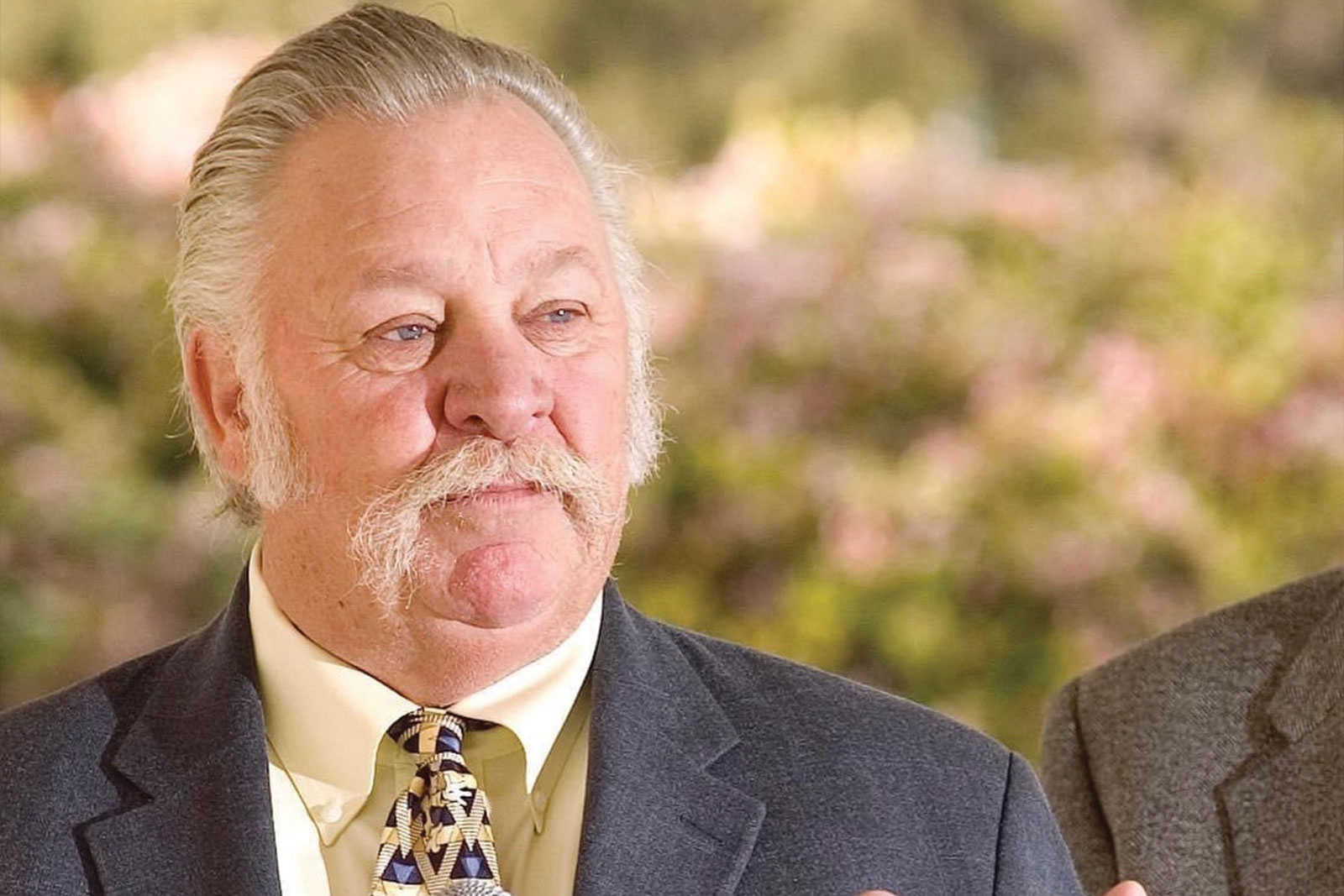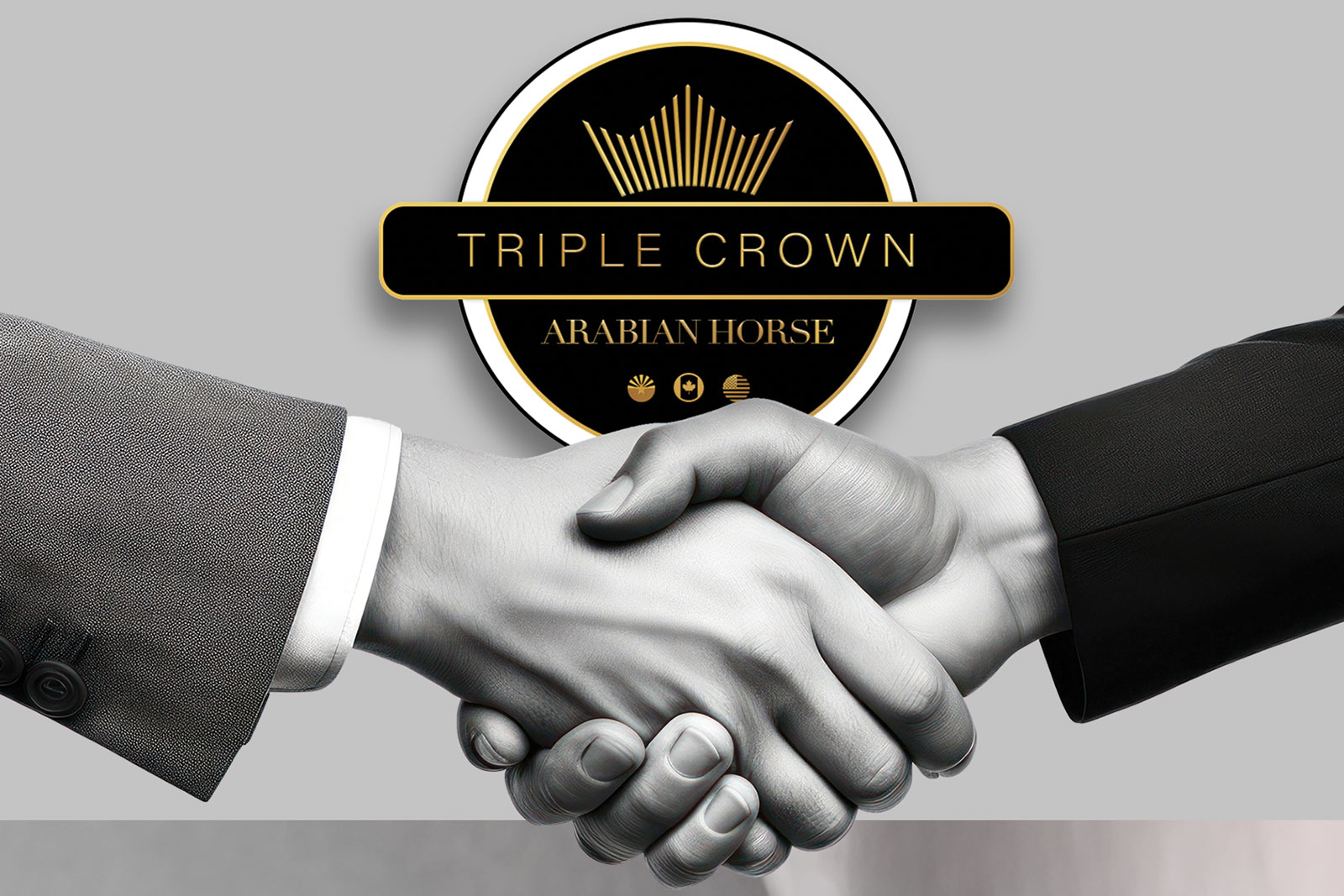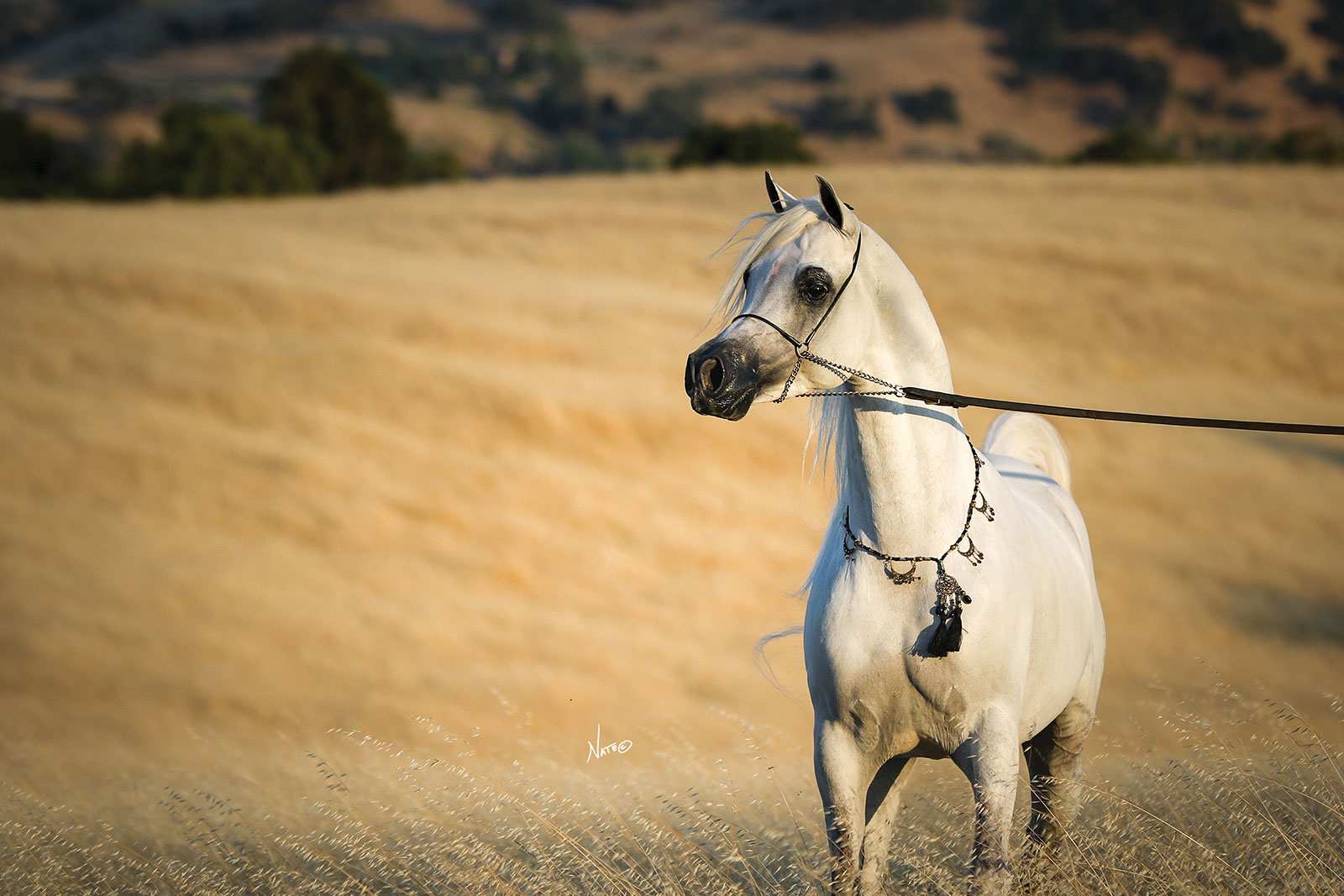(1942 -2023)
Husband, Father, Friend, Mentor, Leader, Teacher, Horseman
By Chris Culbreth
As featured in the Winter 2024 issue of Arabian Horse World.
Bill Hughes was born in Los Angeles, California, on October 8, 1942. He grew up in the shadow of the San Gabriel Mountains in the semi-rural Southern California town of Glendora. Bill attended Pomona Catholic High School, which dates back to the early 1900s.
Upon graduation from Pomona Catholic, Hughes attended the University of Portland, followed by UC Davis. He ultimately finished his undergraduate work at California State Poly Technique University (Cal Poly), Pomona, CA, with a Bachelor’s in Animal Science. He then completed his graduate studies at the University of Nevada, attaining a Masters in Agriculture Economics.
Before and during Bill’s formative years, Southern California was considered a mecca for horses, especially Arabian Horses. In the early 1900s, famed industrialist and cereal magnate W. K. Kellogg founded the Kellogg Ranch in Pomona, California. Kellogg was one of the early importers of Arabian horses into the United States. He boasted one of the finest collections of Arabian horses in the world.
In 1932, as Kellogg was getting much older, he donated his 750-acre Kellogg Ranch to the University of California, with the understanding that they would continue his beloved Arabian horse program.
During World War II, the ranch was taken over by the War Department and was known as the Pomona Quarter Master Depot (Remount). Nearing the end of World War II, General George Patton rescued The Polish Arabian Horse herd from the Nazis and subsequently imported the horses to the Remount at the Kellogg Ranch for safekeeping. Some very well-known and impressive Arabians were sent there, including the great *Bask’s uncle, Witez II.
In the Early 1950s, the International Arabian Horse Association was formed and ultimately housed its headquarters in Burbank, California. Burbank was less than 40 miles from Hughes’ home in Glendora.
Being an avid animal lover, having a natural way with all animals, and growing up near the center of the Arabian Horse community in Southern California, Bill was destined to meet up with what was to become the passion of his life, the Arabian Horse.
Bill’s father owned and operated a typewriter repair business, and in his free time, he loved bowling, a passion shared by Bill’s brother, David. Bill was never interested in bowling, so while his dad and brother were off bowling, he explored his interest in horses. This included hanging out at a local stable. He soon learned all aspects of equine husbandry, as one naturally does while hanging around any horse barn. Whether it was mucking paddocks or riding, Bill was all in.
Ultimately, Hughes was to meet and work for world-renowned Horseman and Judge Billy Harris. Along with other such well-known trainers like Skip Carpenter, Bill began to come into his own as a horse trainer.
Southern California was a hub for the Arabian horse community during Bill’s younger years. He developed lifelong friendships with other notable horsemen, such as Kit Hall, Ron Rhodes, and Dean Miller.
During these formative years, Bill also had the opportunity to work with and learn from well-known Arabian breeders and property investors Frank and Helen McCoy. His friendship with the McCoys was one that was to last for the rest of his life.
During the 1960s and 1970s, it was very common for horse trainers also to have a second career in addition to their training businesses. Bill put his multiple degrees to work, all while still training horses. In 1967, he accepted a teaching position at Cal Poly University, Pomona. He became a full-time Professor of Agriculture Business Management. In 1998, he became the Director of the W.K. Kellogg Arabian Horse Center at Cal Poly. The center was now a world-famous training, breeding, and research program of Arabian horses. The program also included an educational aspect for students in animal husbandry. In 2002 Hughes’s role was expanded to Director of Agriculture Sciences at the Kellogg Center. He retired as a Professor Emeritus in 2010.
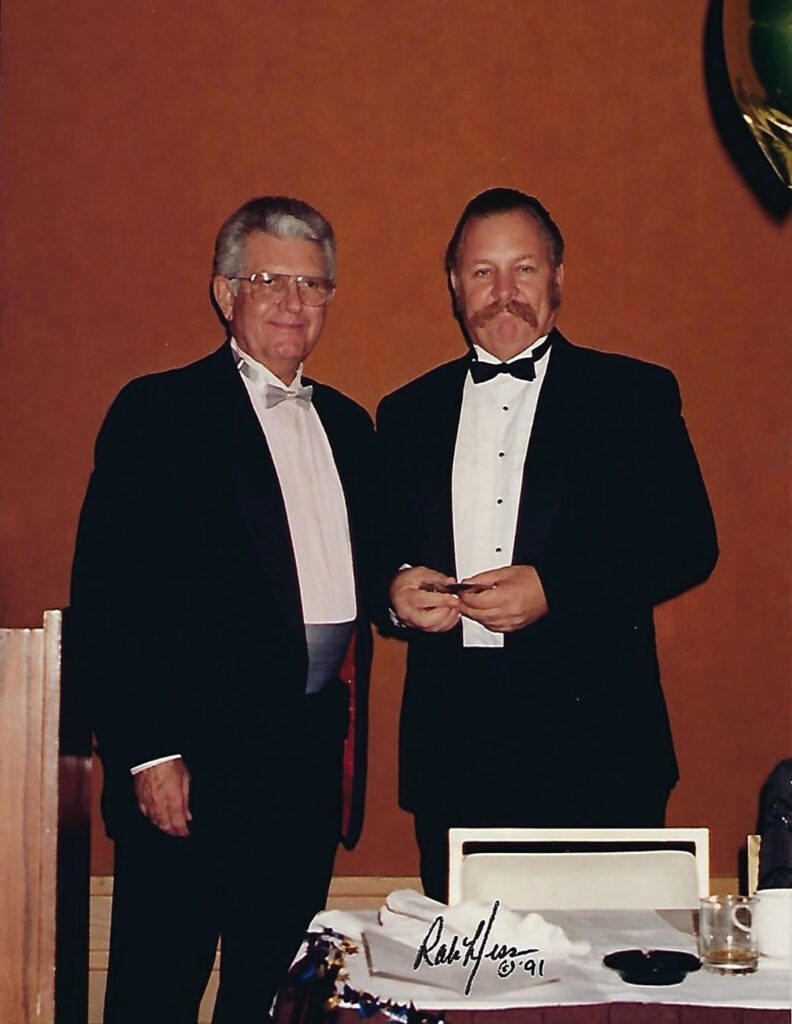
Bill in 1991 when he was the Director of the W.K. Kellogg Arabian Horse Center at Cal Poly alongside Norm Dunn.
While a Professor at the University, Bill met the love of his life, Mary Ann Olin. Mary Ann was studying at the University at the time. She was also an Arabian horse enthusiast and took riding lessons from Bill’s friend and fellow trainer, Dean Miller. As was naturally destined to happen, they were soon to meet up and married in 1969.
During Bill’s tenure as a professor at Cal Poly, he met and became best friends with Norm Dunn, the Director of the beef unit at Cal Poly. Ultimately, Mr. Dunn became Director of the Arabian Horse Center many years before Bill became the center’s Director. During Norm Dunn’s term as Director, he was to oversee many successes within the program. These included the production of the two-time Scottsdale and Canadian National Champion Purebred Arabian Park Horse, Reign On+ (*Bask x Spring Rain). Reign On+ was ridden to his first Scottsdale Championship by Allison Elwell and to his Canadian National Championship by Gene LaCroix.
Because Bill and Norm Dunn shared their passion for the Arabian horse, they quickly became best friends for a lifetime and helped drive one another to the pinnacle of the Arabian horse industry. Both men became licensed equestrian judges and top breeders of Arabian horses.
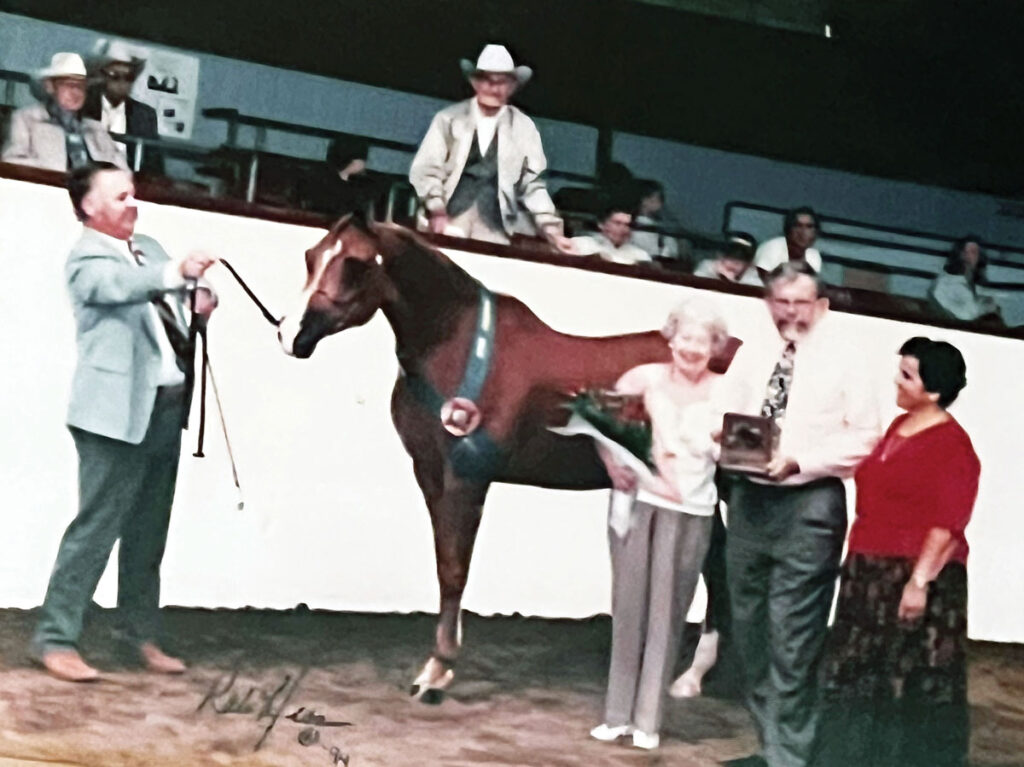
Bill and Jeans Jewel (Proletariat x Queens Doll by The Real McCoy) in 1994. She was bred by Frank and Helen McCoy who later gave her to the Hughes.
In addition, both served full terms as President of the International Arabian Horse Association (IAHA) and served on the Executive Committee of the United States Equestrian Federation (USEF), formally known as the American Horse Shows Association (AHSA).
Both Hughes and Dunn were establishing themselves as well-known equestrian judges. Oftentimes, between leadership roles, judging, teaching, and competing at horse shows, both men would frequently find themselves out of town, away from their growing families. Both Bill and Norm’s families had become very close. In 1972, the decision was made to purchase properties next to one another. By doing this, the two families could rely on one another for support and their continued friendship. Hughes and Dunn’s friends, Frank and Helen McCoy, offered two pieces of property for sale adjacent to McCoy’s Arabian Farm, located near Chino, California. The purchases were made, and properties were developed. Bill and Mary Ann opened Will-Mar Arabians there in 1972.
Will-Mar was soon to become a well-known Arabian breeding and training operation. Known for standing such well-known Stallions as *Barich de Washoe and El Tabal, both owned by Brumarba Arabians. The Hughes were also members of the Comar Bey Beau Syndicate and bred mares to him.
In 1978, one of Bill’s Cal Poly students, Terri Hart, asked him if he would accept her two-year-old Arabian filly into his training program to prepare for the prestigious Arabian Horse Association of Southern California (AHASC) Performance Futurities the following year. Bill did not know it then, but he was to meet a mare that would bring him one of the most extraordinary championship rides of his career. E-Clair (Eleuzis x Parfait) was the mare, and he expertly began to prepare her for the 3-year-old western pleasure futurity held at the Earl Warren Fairgrounds in picturesque Santa Barbara, California, in September of 1979.

Bill and E-Clair (*Eleuzis x Parfait) in 1979 unanimously winning AHASC Performance Futurity.
During those years and due to the event’s large number of competitors, the Futurity class consisted of three rides over three days. Each ride would serve to eliminate several horses. By the final day, the 60+ horses would be paired down to about ten. During the first day of the competition, E-Clair and Bill were chosen unanimously as winners by all three judges.
The second ride proved to be equally successful. Knowing the value of a flawless performance for his final ride, Bill asked Éclair’s owner, Terri Hart, if she would mind if he showed her in his favorite work saddle instead of his newer silver-covered show saddle. His favorite saddle was an antique Mexican Vaquero saddle, known for its abnormally large and flat saddle horn, typical of the Vaquero style saddles. Terri agreed, wanting Bill to be as comfortable as possible. However, she did go down to Santa Barbara’s landmark Equestrian tack store, Jedlickas, and purchased a new pair of silver stirrups to dress up his old saddle. On that final day, the judges decided to work off some of the finalists in pairs. During these deliberations, they never asked Bill and E-Clair to work off.
The time came for the announcement of Champion.
E-Clair, owned by Terri Hart and ridden by Bill Hughes, was named Champion. The judges had already decided she was the unanimous Champion and did not feel the need to include her in the workoffs. The photo of the win featuring Éclair, Terri Hart, and Bill being presented the Champion garland, a silver buckle, and a beautiful show saddle permanently hangs in Bill’s office. As long as I knew Bill, he always proudly wore that buckle.
Not content with just being a husband, father, trainer, breeder, and leader within the Arabian horse community, Bill was also a well-known and respected equestrian judge. He received his first judge’s license in 1971 from the American Horse Shows Association (AHSA). During his judging career, he held licenses for Arabian, Western, Andalusian, Morgan, Friesian, and National Show Horse. He officiated hundreds of competitions, including National Championships in both the United States and Canada and Championship shows in Australia, Brazil, England, and Spain.
In the early 1980s, Bill took over as Chairman of what is now known as the AHA Judges and Stewards Education and Evaluation Commission. Prior to his leadership, Arabian judges earned their licenses in part by attending a two-day AHSA Judges Seminar. Being an educator, he saw a need to expand the education and testing program for Arabian judges. This was to include an expanded program of live judging and learning modules in areas such as conformation, discipline rules, procedures, and movement. The testing and evaluation of current and potential judges were also expanded.
The IAHA/AHA judges’ education and evaluation program would soon become a model for numerous other breeds and elevate the knowledge of all Arabian judges and confidence in judging by Arabian exhibitors.
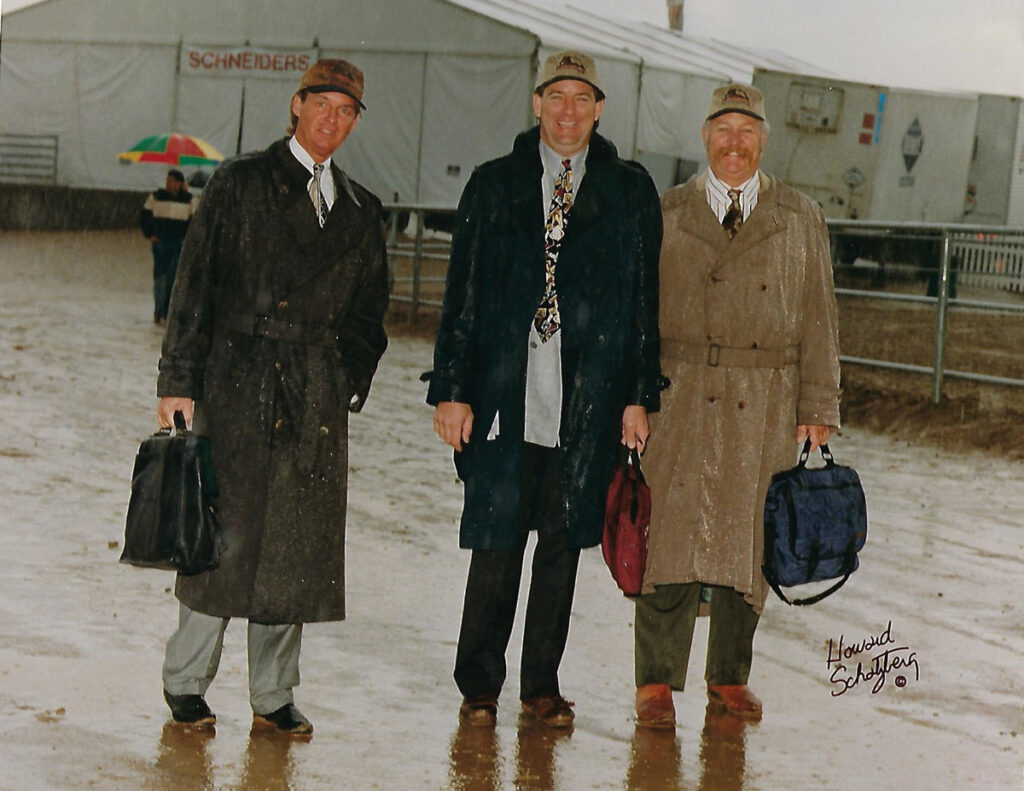
Ross Tarkington, Stan Morey, and Bill judging at Scottsdale.
Among one of the many benefactors of the new and expanded judges’ program was the current AHA Executive Director and former AHA Judges and Stewards Commissioner, Stan Morey. As Bill was always supportive of young people working to navigate a career in the horse industry, he was quick to get to know this up-and-coming horseman. They soon established a professional friendship, and Bill was very supportive of Stan. Bill encouraged him to pursue his judge’s license, which Stan earned in 1992. Stan and Bill had the opportunity to officiate together many times, which included two times at the prestigious Scottsdale Arabian Horse Show.
Stan recalls about Bill, “Bill always had a calm and low-key demeanor about him. But when it came to looking at horses, he was always sharp and solid in his knowledge. He always appreciated a good riding horse and consistently supported his younger fellow judges.”
Stan goes on to say, “Bill was always, first and foremost, all about the Arabian horse.”
Stan’s favorite quote by Bill Hughes was, “This horse does a lot of things for a lot of people, you need to be a contributor, Stan.”
The giving back theme was constant throughout Bill’s life. Countless successful equestrian professionals within the industry credit Bill for his strong support and outstanding mentorship of young people.
Immediate past President of the Arabian Horse Association (AHA) and National level equestrian judge Nancy Harvey credits Bill for his part in her becoming a successful Arabian Horse Association leader and successful professional judge. Current AHA President and National level judge Deborah Johnson shares a similar sentiment.
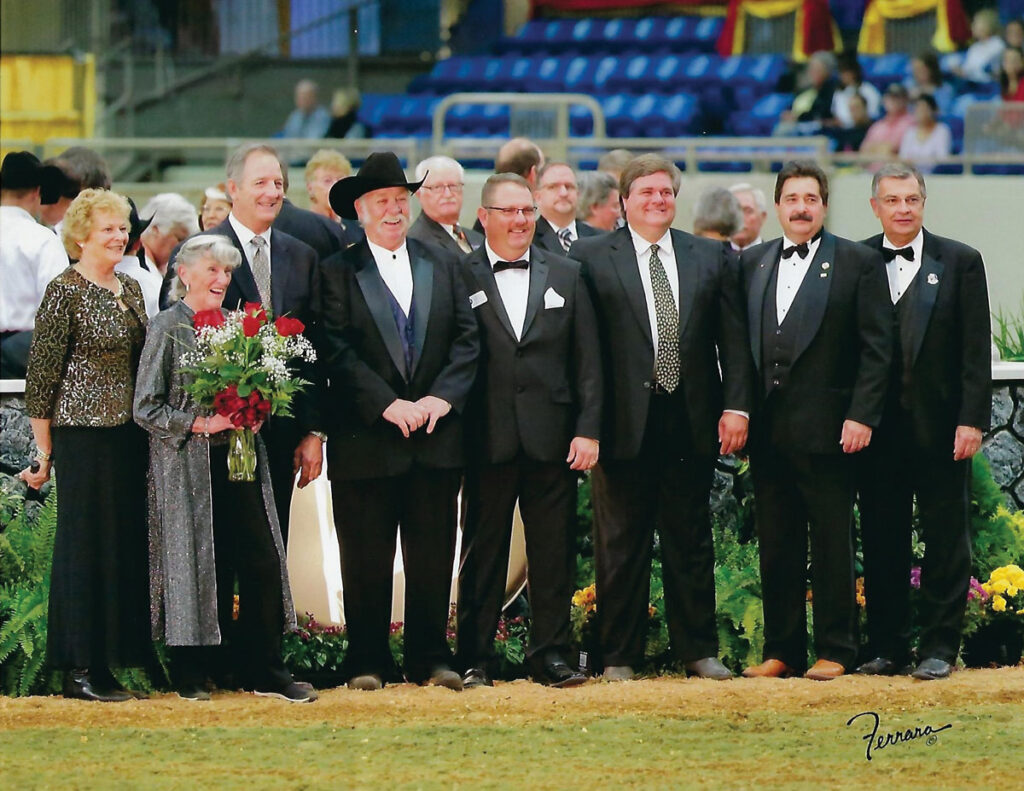
The US National Show Commission during US Nationals including Cynthia Richardson (AHA President), Glen Petty (AHA Executive Director), and Bill Hughes (Chairman).
Long-time professional horseman and fellow national-level judge Micheal Damianos shared his memories of judging at the Scottsdale Arabian Horse Show in his early years with Bill Hughes. “I was amazed. We could not go anywhere that people did not know him. He seemed like a regular guy to me. During the next 30 years, I got to know him as a professor, educator, horse judge, Arabian breeder, AHA President, horse show manager, horse appraiser, horse trainer, joke teller, equine diplomat, husband, and father. Then I knew why he knew so many people because he positively impacted countless lives in all those roles. He left his world a much better place than he found it.”
Bill was a forever mentor of young people within the horse community. His mentorship was also with his students at Cal Poly. Bill’s wife, Mary Ann, shared the story of one of Bill’s students. The young man attended several of Professor Hughes’s classes at the university. Bill recognized the young man’s intelligence and desire to become a successful professional in whatever career he endeavored. Bill also observed some traits in the young man as areas that might limit his potential success throughout his career. Bill worked with this young man over a period of time through patient dialog and acted as a supportive mentor. Years later, the same gentleman contacted Bill and thanked him.
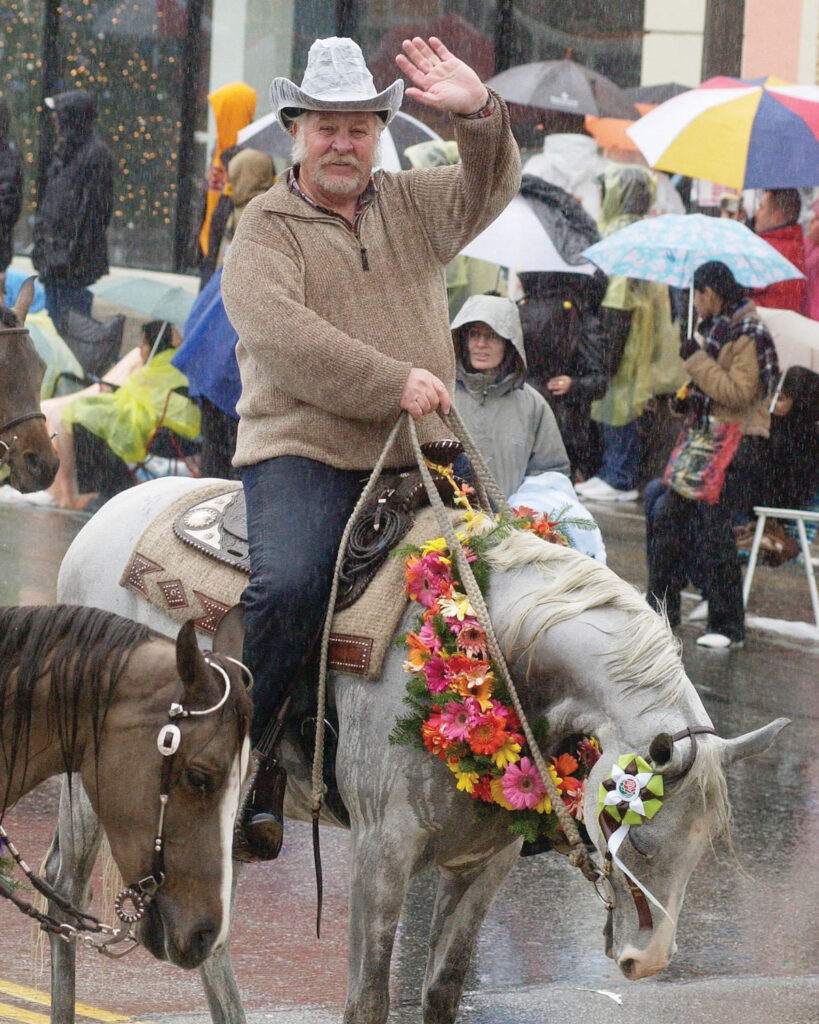
Bill participating in the Rose Parade on New Years Day in 2006.
He had become a well-respected high school teacher and was accomplishing great things with his life. Volumes of books could be filled with similar stories involving people whom Bill Hughes had helped, mentored, and supported throughout their lives.
Hughes’s dedication as a professor and a professional horseman never overshadowed his role as a loving husband, father, and grandfather. Bill and Mary Ann Hughes were married for 54 years and had three sons, Christopher, Kevin, and Brian. In addition, Bill enjoyed spending time in his later years with his two grandsons, Elliott and Zachary.
During one of my recent conversations with Mary Ann, I asked if she felt I should share one unfortunate and tragic chapter of their lives. Her reply was both inspiring and heartwarming. She felt that the incident was a part of Bill’s story, and despite its obvious disquietude, it provided valuable insight into exactly what kind of person Bill was.
In the Summer of 1983, Bill and Mary Ann’s son, Christopher, was spending the night with his best friend and his family up the street from the Hughes’ Chino Hills home. Sometime during the night, an escaped inmate from the Chino Correctional Institute entered the friend’s home, where their son was visiting, and tragically took the lives of all present, except for Christopher’s best friend, who was severely injured and traumatized. The following morning, Bill and Mary Ann could not reach their son by phone and became extremely concerned. Bill rushed to the home to investigate and was the first to discover the tragedy.
Needless to say, this horrific event preceded a long and drawn-out series of investigations, trials, and subsequent conviction of the heinous perpetrator.
As testimony to the character and strength of Bill, as well as the entirety of the Hughes and their extended family, this period of tribulation was met with fortitude, courage, and an unbelievable resolve. In addition, the outpouring of support toward the family by the equestrian, collegiate, and community was a true testament to how beloved the Hughes family was to everyone who knew them.
During Bill’s professional career, he held numerous positions within many organizations. This was due in part to his dedication to service to others. Here is a partial list of a few of the various roles:
- President, International Arabian Horse Association (last president of this organization before its merger)
- President, Arabian Horse Association (first president of this organization after merger with IAHA)
- President, Arabian Horse Association of Southern California (AHASC)
- Vice President, International Arabian Horse Association
- Director, Region One of the Arabian Horse Association
- Show Manager, AHASC Fall Horse Show
- Show Manager, Region One Championships
- Chairman AHA Judges and Stewards Steering Committee
- Chairman, AHA Working Western Committee
- Chairman, United States Arabian and Half Arabian National Championships Show Commission
- Treasurer, United States Equestrian Federation (USEF)
- Vice President, USEF Affiliates Working Group
On February 25, 2018, as Past President of the Arabian Professional and Amateur Horseman’s Association (APAHA), I had the honor of presenting Bill with the APAHA Lifetime Achievement Award. This award was presented to him during the APAHA Annual Awards Banquet held after the culmination of the annual February Scottsdale Arabian Horse Show in Arizona. Bill graciously accepted the award and offered a very inspirational speech to the many attendees. Keeping with his excellent character and sense of humor, he also included a brief roasting of yours truly.
In 2015, Mr. William Hughes was inducted into the Arabian Horse Judges Hall of Fame. The ceremony was held in center ring at the US Arabian National Championships on finals night in Tulsa, Oklahoma. Bill retired from judging in 2017.
Being a “Horseman.” The textbook definition says, “A horseman is someone who is a rider on horseback, especially a skilled one.’ For Bill Hughes, that definition would never hold up.
The following is not meant as a direct quote from Bill but is intended as a synopsis of what he was trying to convey to me over our forty-plus-year friendship regarding how he felt that one became a “Horseman.” To Bill, the term “Horseman” was sacrosanct. He felt that to earn such an auspicious title as “Horseman,” one had to embody a myriad of virtues and hold many positive characteristics. He held that the title was earned over a lifetime of horsemanship. Virtues include skill, talent, compassionate animal husbandry, giving back to the breeds, sharing knowledge, teaching, training, mentorship, success, and leaving the horse sports better than you found them when your time is over. These were all important qualifications for the title.
He felt these things and was more determined whether you were a “Horseman” or not. Bill held that becoming a “Horseman” was a title earned throughout one’s journey with horses. I think that everyone who knew Bill Hughes would consider him a “Horseman,” even by his own implied definition.
After Bill retired from teaching, training horses, and judging, he went on to become a successful equine consultant and continued community service on a local level.
Upon the passing of Frank McCoy and later, his wife Helen, Helen’s last wish was that their beautiful Chino Hills farm and entire property be donated to the City of Chino Hills and held in trust as a local equestrian park. Bill again took a leadership role as Chief Administer of the estate and McCoy’s 2.3 million dollar donation to create the McCoy Equestrian Center. Bill also agreed to serve on the Overlay Zone Advisory Committee to advocate for the city’s equestrian heritage.
In honor of serving their community, Bill and Mary Ann were named Outstanding Citizens of the Year by Chino Hill’s Champions Newspaper in July of 2023.
Proving that even great mentors had themselves outstanding mentors in their own lives, Bill was always inspired by great horsemen, such as former AQHA President and AQHA Hall of Fame inductee Don Burt (1930-2012). The two men always maintained a close friendship throughout their lives. Another friend and mentor of Bill’s was the famous Arabian judge Peter Cameron (1928-2019). Peter had a unique judging style, and Bill always admired and respected him.
Certainly, a significant consideration of Bill’s life was his love of dogs, all dogs. It was prevalent at horse shows to see Bill sitting beside some random dog, even if he had never met it. He would be fully immersed and heaping praise upon the fortunate animal. Most importantly, and a testimony to Hughes’s character, all dogs loved Bill right back.
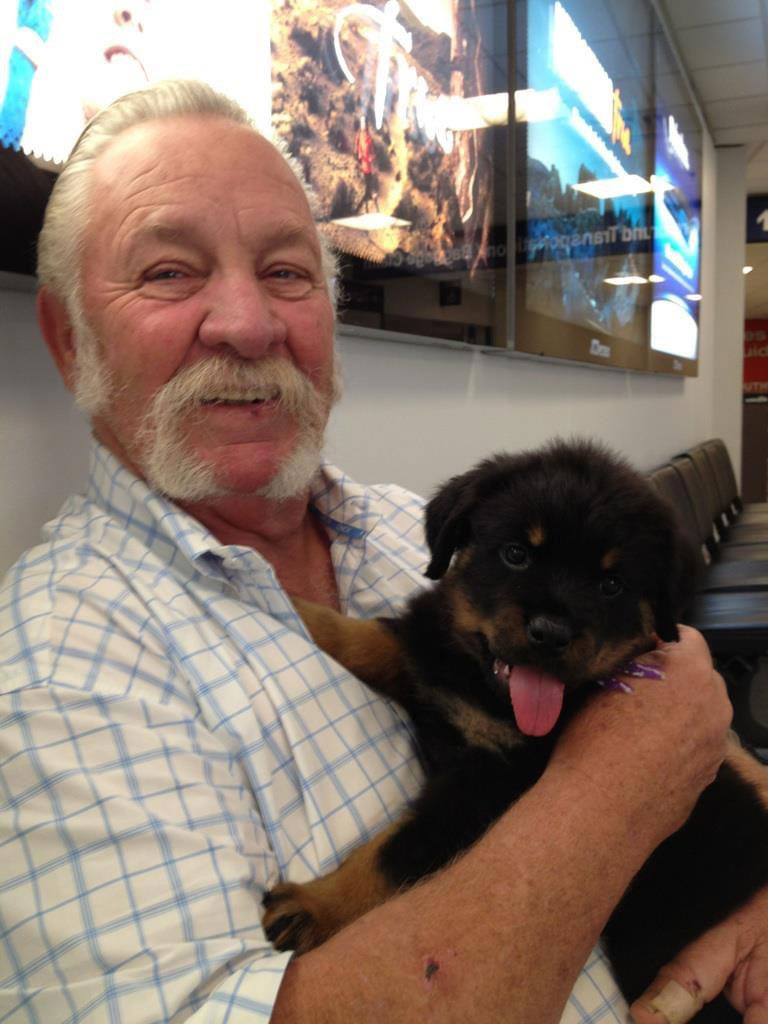
Bill with a puppy.
On September 25, 2023, Bill Hughes passed away. He was surrounded by his family. Bill was 80 years old and was laid to rest in a small family ceremony.
In late October of 2023, a few days after the end of the AHA National Championships in Tulsa, Oklahoma, a Memorial Celebration of Life was held at the McCoy Arabian Equestrian Center in Chino Hills, California. The turnout of Bill’s friends was awe-inspiring. Many stories were told, and Bill was sent off with a wonderful feeling of kindness and brotherhood by all.
In January of 2024, the United States Equestrian Federation, during their annual Pegasus Awards Banquet, posthumously awarded Bill Hughes the Richard E. McDevitt Award of Merit for his outstanding service to the equestrian community. Bill’s wife, Mary Ann, attended the ceremony and accepted the award on Bill’s behalf.
In closing, I would like to share a quote that Bill’s friend, Micheal Damianos, shared with me.
“Einstein once said, “Only a life lived for others is a life worthwhile.”
Mike goes on to say, “Bill Hughes had an extremely worthwhile stay on earth.”
I think we can all agree on that.

Chris and Michele celebrating Bill’s 80th birthday with his wife, Mary Ann in 2022.
Chris Culbreth and his wife, Michele, own and operate Culbreth Equine Training and Management, LLC., located in Scottsdale, Arizona. Chris began his professional career working for the Hughes’ and was a lifelong student, friend, and admirer of Bill Hughes. He credits the trajectory of his career to the lessons taught by Hughes and highly values the mentorship he received from Bill and Mary Ann Hughes. Chris is a successful Arabian Horse trainer, judge, and AHA Committee Chairman.



